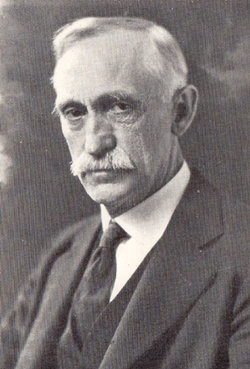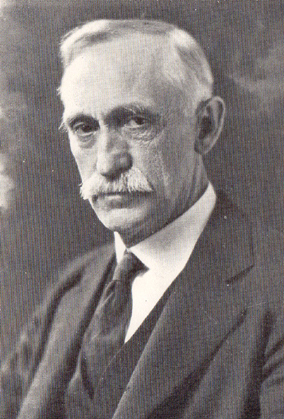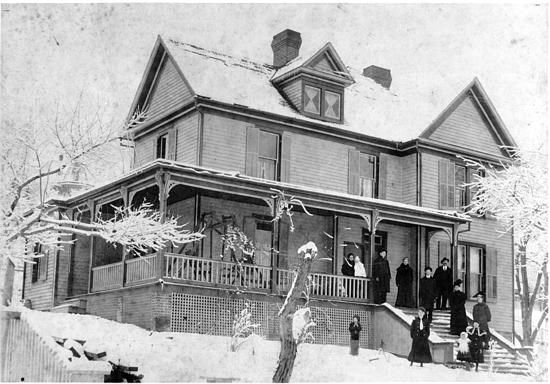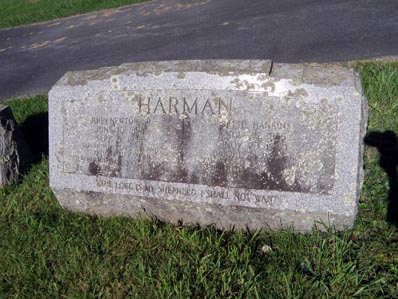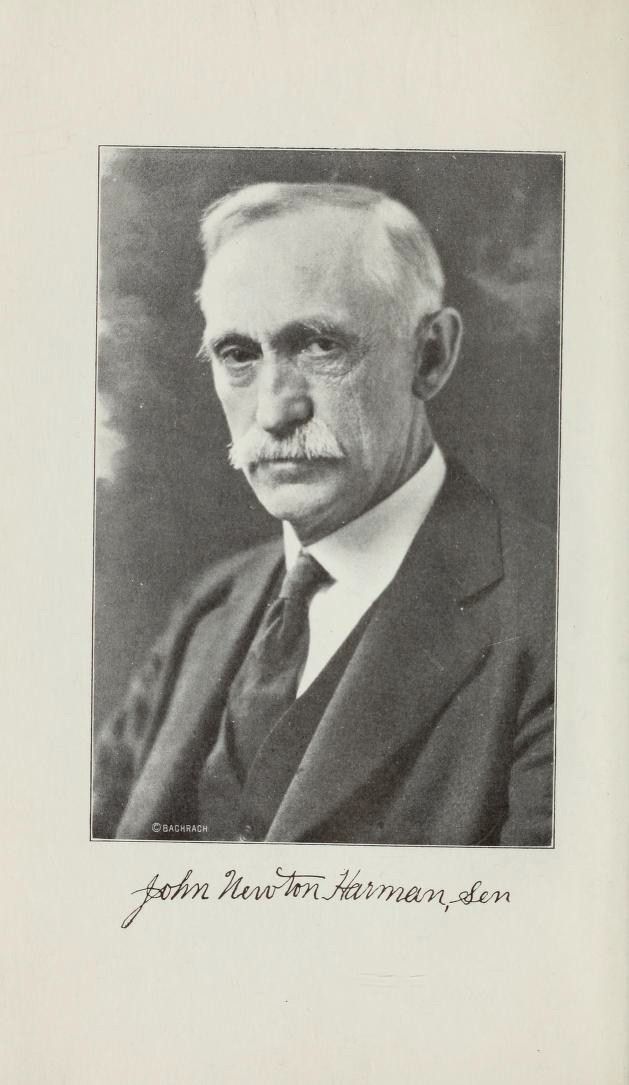John was a teacher and one of the founders of Tazewell College. He was a minister and the State Evangelist under Virginia Christian Missionary Society in 1895. He was the founder, owner and editor of the "Tazewell Republican." He was elected Commonwealth's Attorney for Tazewell County, and elected State Senator in 1901. John entered coal business at Raven, VA, organizing several coal companies. He was a member of the Virginia Historical Society and author of "Annals of Tazewell County, Virginia" and the author of "Harman Genealogy."
From "Sketches of Our Mountain Pioneers," by J.W. West:
John Newton Harman was born June 10, 1854, in Giles (now Bland) Co., Virginia, a son of Robert Wilson and Cynthia Bird Harman. His ancestry may be traced back to Heinrich Adam Harman, who was a member of the first permanent English settlement on New River in Virginia, prior to 1745. On September 10, 1878, he married Bettie Hankins. To them were born eight children. He taught school four years in Bland County and three years in Tazewell. He was affiliated with Tazewell College, and his home served as the girls' dormitory. He and his wife and daughter Hattie sacrificed much in time and labor for this institution. During its short period of existence, several preachers went out from this school Mr. Harman was elected Commonwealth's Attorney in 1883 and again in 1887. He was elected State Senator in 1901 and became the author and father of the first Prohibition Law for a large territory, enacted by the General Assembly of Virginia. The sale and manufacture of alcoholic beverages were prohibited in the counties of Giles, Buchanan and Tazewell. In September, 1922, he was appointed Head of the Field Force and Legal Advisor to the Federal Director of Virginia. He was also the author of "Annals of Tazewell County," (two volumes), and of "Harman Genealogy," published in 1922 and 1925, respectively. Extracts from his "Autobiographical Notes" supplies material for much of which follows. He declares in these Notes that the most important event in his early life was his decision to live a religious life. At the age of nineteen, he became a member of the Primitive Baptist Church. He lived within a mile of Mt. Zion Church, a small building of logs, locate about a mile east of what is now Bland Court House. Elder A.A. Ashworth was the pastor, and Rev. William Hicks, a Methodist preacher, frequently preached his best sermons in this "meeting house." The very cordial relations that existed between the two preachers, so unusual in that day, made such an impression on his life that he became a strong advocate of Christian union. The church of which he was a member transacted much business. If serious differences arose between members, after such business meetings and the Scriptural steps which had been taken to effect a reconciliation were unavailing, the church proceeded to hear and determine the matter and proclaim disciplinary measures to be used. At such meetings, inquiry was made about the sick and those in need. If a member permitted one of his family to go to the "Poor House," fellowship of the church was withdrawn unless the matter was adjusted. This ideal condition in "social service' made a deep impression on his mind, and he was ever a real friend and helper of the poor. During times of distress in winter among he poor at Tazewell, Virginia, he usually led in raising funds and securing supplies for the needy. Elder Ashworth urged him to preach after he had demonstrated his interest in the study of the Scriptures. He selected for his first text - "By the grace of God I am what I am," and practiced preaching his sermon to stumps and trees until he felt equal to facing an assembly. He appeared before the congregation and announced his text, but could go no further, for "stage fright" over-whelmed him. Ere long, however, the "stage fright" departed, and he could preach to congregations better than to stumps and trees. Although he was a Primitive Baptist preacher, he became convinced that the Christian Church occupied the Scriptural ground as the proper basis for Christian union, and he decided to unfold gradually his convictions, until he could lead the churches for which he preached to forsake party names and traditions, until they too would be willing to unite in the movement of those with such a distinctive message. Some of his Baptist brethren became aware of his differing from Baptist teaching and practice. The question of discipline arose. One of the brethren advised them not to be hasty in action, and suggested that "We will improve him (he meant reprove him, but he was very illiterate) and if that won't do, we will inject him." The leaving had gotten in its work, and about four churches followed him when he affiliated with the restoration movement. He aided in the organization of the following churches: Burke's Garden, Thompson Valley, Poor Valley, Pounding Mill, Richlands, Raven, Tazewell, Graham (now Bluefield, VA.) and Bluefield, WV. He was minister of most of these churches at different times, except Burkes Garden, Thompson Valley and Poor Valley. In 1895, he was employed as State Evangelist to work under the auspices of the State Board and served only six months because he was needed to minister to the infant church in Bluefield, WV. On December 1, 1895, he began as mission pastor under the auspices of the Virginia State Board, which agency supplemented his salary. Bluefield, WV, at that time cooperated in the Virginia State work. He continued in this work until June 30, 1897, preaching to large crowds, and the church added about as many members as all the other churches in that new city. About October 1, 1897, Mr. Harman became full-time State Evangelist and continued until the latter part of 1898. Resided in town with a large family, he was forced again and again to stop preaching and enter business to pay off obligations. He was a successful businessman. On one occasion, he decided to cease devoting all his time to preaching for a period and inserted a notice in both county papers that he was resuming the practice of law. At that time, he had only $2.00 left. He waited several days for clients, but none appeared. One afternoon, he heard a man walking up the steps and hoped it might be a client. The man was John Moore, a painter, who while hunting had found a family all seriously ill except a fourteen-year-old girl. It was a home of poverty and real distress. Mr. Harman spent his last $2.00 for food and, together with the painter, went to the mountain cabin. He swept the floor and cleaned the house while Mr. Moore, the painter, cut wood. He then conducted a religious service and returned home. That night, he was called to marry a couple and the groom gave him a $20.00 gold piece. The following Sunday, he preached in Tazewell where he resided, and brothers H.I. Brittain and H.G. McCall each handed him a $10.00 bill. Truly he could say to his wife, "We are fed by the Ravens." At the following term of the Circuit Court, there were sixteen new cases on the docket. He was employed in fifteen of them. When he became a candidate for Commonwealth's Attorney, he called upon the voters by riding about on horseback. Under the old Underwood Constitution, which Alexander Campbell helped to frame as a member of the Constitutional Convention when Virginia and West Virginia were one state, negroes could vote without such qualifications as were later devised to debar many of them under the new Constitution for Virginia. Brother Harman had heard of three negro boys of voting age, sons of a widow. He rode up to the house to confer with them about voting for him. They were away from home at work, but their mother informed him that she could attend to any business for her boys. He then informed her of his mission. Then she asked him, "What might your name be?" He replied, "My name is Harman." She exclaimed, "Laws a mercy, we may be some kin, that's my name." Then she began to inform him of her needs and began - "I needs five cents worth of snuff, (long pause), I needs five cents worth of soda (long pause), and I needs five cents worth of soap." Our candidate hurriedly placed a quarter upon the gate post and rode off, puzzled why she, so black, ever surmised that they might be "some Kin." On September 10, 1928, on their golden wedding anniversary, he said, "The Lord has been good to me in more ways than can be enumerated, but in this connection, I thank Him for His providence in accordance with Proverbs 19:14; many pitfalls in my business life have been avoided and numerous mistaken theories of life and of living have been exploded by timely suggestions of the other partnership. Her adroitness in managing me so concealed her dominance that it was ten years before I found out that I was not a Caesar in my own home. After ten years of bondage, I had learned to like it, and made no serious effort for freedom . Whatever success we have had in life is largely attributable to her knowledge of how to manage me. She has proven that no mental reservations were made when she promised at the marriage altar, fifty years ago, to keep me in sickness and in health, and forsake all others and cleave alone to me. She has avoided nagging and prowess in the management of her husband and household." An account of his death which occurred on September 21, 1934, is to be found in the "Bluefield Daily Telegraph" of that date. It reads as follows: "The funeral and burial of J.N. Harman Sr., aged 80, took place last Sunday afternoon. The service was held in the Methodist Church because his own church, the Christian, would not accommodate the crowd. In 1906, he became interested in the coal industry of the Southwest and organized the Raven Collieries Company and the Red Ash Coal company. As a capstone to an active life in politics, in religion, and in business, he compiled a history of Tazewell County and other works of historical interest and value, which have become valuable reference works of this territory."
John was a teacher and one of the founders of Tazewell College. He was a minister and the State Evangelist under Virginia Christian Missionary Society in 1895. He was the founder, owner and editor of the "Tazewell Republican." He was elected Commonwealth's Attorney for Tazewell County, and elected State Senator in 1901. John entered coal business at Raven, VA, organizing several coal companies. He was a member of the Virginia Historical Society and author of "Annals of Tazewell County, Virginia" and the author of "Harman Genealogy."
From "Sketches of Our Mountain Pioneers," by J.W. West:
John Newton Harman was born June 10, 1854, in Giles (now Bland) Co., Virginia, a son of Robert Wilson and Cynthia Bird Harman. His ancestry may be traced back to Heinrich Adam Harman, who was a member of the first permanent English settlement on New River in Virginia, prior to 1745. On September 10, 1878, he married Bettie Hankins. To them were born eight children. He taught school four years in Bland County and three years in Tazewell. He was affiliated with Tazewell College, and his home served as the girls' dormitory. He and his wife and daughter Hattie sacrificed much in time and labor for this institution. During its short period of existence, several preachers went out from this school Mr. Harman was elected Commonwealth's Attorney in 1883 and again in 1887. He was elected State Senator in 1901 and became the author and father of the first Prohibition Law for a large territory, enacted by the General Assembly of Virginia. The sale and manufacture of alcoholic beverages were prohibited in the counties of Giles, Buchanan and Tazewell. In September, 1922, he was appointed Head of the Field Force and Legal Advisor to the Federal Director of Virginia. He was also the author of "Annals of Tazewell County," (two volumes), and of "Harman Genealogy," published in 1922 and 1925, respectively. Extracts from his "Autobiographical Notes" supplies material for much of which follows. He declares in these Notes that the most important event in his early life was his decision to live a religious life. At the age of nineteen, he became a member of the Primitive Baptist Church. He lived within a mile of Mt. Zion Church, a small building of logs, locate about a mile east of what is now Bland Court House. Elder A.A. Ashworth was the pastor, and Rev. William Hicks, a Methodist preacher, frequently preached his best sermons in this "meeting house." The very cordial relations that existed between the two preachers, so unusual in that day, made such an impression on his life that he became a strong advocate of Christian union. The church of which he was a member transacted much business. If serious differences arose between members, after such business meetings and the Scriptural steps which had been taken to effect a reconciliation were unavailing, the church proceeded to hear and determine the matter and proclaim disciplinary measures to be used. At such meetings, inquiry was made about the sick and those in need. If a member permitted one of his family to go to the "Poor House," fellowship of the church was withdrawn unless the matter was adjusted. This ideal condition in "social service' made a deep impression on his mind, and he was ever a real friend and helper of the poor. During times of distress in winter among he poor at Tazewell, Virginia, he usually led in raising funds and securing supplies for the needy. Elder Ashworth urged him to preach after he had demonstrated his interest in the study of the Scriptures. He selected for his first text - "By the grace of God I am what I am," and practiced preaching his sermon to stumps and trees until he felt equal to facing an assembly. He appeared before the congregation and announced his text, but could go no further, for "stage fright" over-whelmed him. Ere long, however, the "stage fright" departed, and he could preach to congregations better than to stumps and trees. Although he was a Primitive Baptist preacher, he became convinced that the Christian Church occupied the Scriptural ground as the proper basis for Christian union, and he decided to unfold gradually his convictions, until he could lead the churches for which he preached to forsake party names and traditions, until they too would be willing to unite in the movement of those with such a distinctive message. Some of his Baptist brethren became aware of his differing from Baptist teaching and practice. The question of discipline arose. One of the brethren advised them not to be hasty in action, and suggested that "We will improve him (he meant reprove him, but he was very illiterate) and if that won't do, we will inject him." The leaving had gotten in its work, and about four churches followed him when he affiliated with the restoration movement. He aided in the organization of the following churches: Burke's Garden, Thompson Valley, Poor Valley, Pounding Mill, Richlands, Raven, Tazewell, Graham (now Bluefield, VA.) and Bluefield, WV. He was minister of most of these churches at different times, except Burkes Garden, Thompson Valley and Poor Valley. In 1895, he was employed as State Evangelist to work under the auspices of the State Board and served only six months because he was needed to minister to the infant church in Bluefield, WV. On December 1, 1895, he began as mission pastor under the auspices of the Virginia State Board, which agency supplemented his salary. Bluefield, WV, at that time cooperated in the Virginia State work. He continued in this work until June 30, 1897, preaching to large crowds, and the church added about as many members as all the other churches in that new city. About October 1, 1897, Mr. Harman became full-time State Evangelist and continued until the latter part of 1898. Resided in town with a large family, he was forced again and again to stop preaching and enter business to pay off obligations. He was a successful businessman. On one occasion, he decided to cease devoting all his time to preaching for a period and inserted a notice in both county papers that he was resuming the practice of law. At that time, he had only $2.00 left. He waited several days for clients, but none appeared. One afternoon, he heard a man walking up the steps and hoped it might be a client. The man was John Moore, a painter, who while hunting had found a family all seriously ill except a fourteen-year-old girl. It was a home of poverty and real distress. Mr. Harman spent his last $2.00 for food and, together with the painter, went to the mountain cabin. He swept the floor and cleaned the house while Mr. Moore, the painter, cut wood. He then conducted a religious service and returned home. That night, he was called to marry a couple and the groom gave him a $20.00 gold piece. The following Sunday, he preached in Tazewell where he resided, and brothers H.I. Brittain and H.G. McCall each handed him a $10.00 bill. Truly he could say to his wife, "We are fed by the Ravens." At the following term of the Circuit Court, there were sixteen new cases on the docket. He was employed in fifteen of them. When he became a candidate for Commonwealth's Attorney, he called upon the voters by riding about on horseback. Under the old Underwood Constitution, which Alexander Campbell helped to frame as a member of the Constitutional Convention when Virginia and West Virginia were one state, negroes could vote without such qualifications as were later devised to debar many of them under the new Constitution for Virginia. Brother Harman had heard of three negro boys of voting age, sons of a widow. He rode up to the house to confer with them about voting for him. They were away from home at work, but their mother informed him that she could attend to any business for her boys. He then informed her of his mission. Then she asked him, "What might your name be?" He replied, "My name is Harman." She exclaimed, "Laws a mercy, we may be some kin, that's my name." Then she began to inform him of her needs and began - "I needs five cents worth of snuff, (long pause), I needs five cents worth of soda (long pause), and I needs five cents worth of soap." Our candidate hurriedly placed a quarter upon the gate post and rode off, puzzled why she, so black, ever surmised that they might be "some Kin." On September 10, 1928, on their golden wedding anniversary, he said, "The Lord has been good to me in more ways than can be enumerated, but in this connection, I thank Him for His providence in accordance with Proverbs 19:14; many pitfalls in my business life have been avoided and numerous mistaken theories of life and of living have been exploded by timely suggestions of the other partnership. Her adroitness in managing me so concealed her dominance that it was ten years before I found out that I was not a Caesar in my own home. After ten years of bondage, I had learned to like it, and made no serious effort for freedom . Whatever success we have had in life is largely attributable to her knowledge of how to manage me. She has proven that no mental reservations were made when she promised at the marriage altar, fifty years ago, to keep me in sickness and in health, and forsake all others and cleave alone to me. She has avoided nagging and prowess in the management of her husband and household." An account of his death which occurred on September 21, 1934, is to be found in the "Bluefield Daily Telegraph" of that date. It reads as follows: "The funeral and burial of J.N. Harman Sr., aged 80, took place last Sunday afternoon. The service was held in the Methodist Church because his own church, the Christian, would not accommodate the crowd. In 1906, he became interested in the coal industry of the Southwest and organized the Raven Collieries Company and the Red Ash Coal company. As a capstone to an active life in politics, in religion, and in business, he compiled a history of Tazewell County and other works of historical interest and value, which have become valuable reference works of this territory."
Family Members
Sponsored by Ancestry
Advertisement
Explore more
Sponsored by Ancestry
Advertisement
